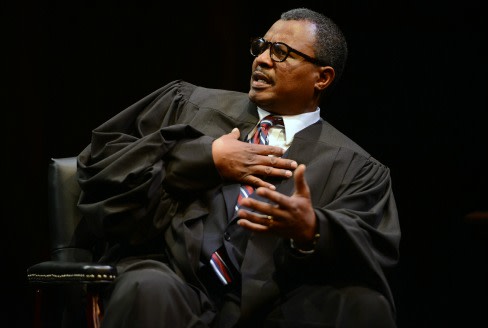Florida Studio Theatre's Thurgood
[caption id="attachment_1074" align="alignnone" width="488"]
By Kay Kipling
The challenges of presenting a one-man show go beyond a need for stamina, a good memory and a strong stage presence. While the actor or actress needs to possess all of these, the show itself should contrive a method of showing, as well as telling, the story. That ability, or lack of, can sometimes make or break a one-man effort.
In George Stevens Jr.’s Thurgood, currently onstage at Florida Studio Theatre’s Keating Theatre, there are two things working in the play’s favor: One is that its subject, the first African-American Supreme Court Justice, Thurgood Marshall, had a long and dramatic career before ever reaching that bench. The other is a strong performer in Montae Russell, who not only portrays the title character but some of the main influences and inspirations around him.
It’s still not always enough to make Thurgood feel like a real and alive stage drama, rather than a recitation of historic moments and events in Marshall’s life. But in the 90 or so (intermissionless) moments of Thurgood, directed forcefully by Kate Alexander, we are bound to learn something about the man we didn’t know.
The evening opens with the aging Marshall booming out a speech at Howard University, the all-black college where he attended law school after being rejected by the University of Maryland because of his race. But Russell soon tosses away his cane and goes back in time to portray a young lawyer, full of energy and zeal for the civil rights fight he spent most of his life on.
Over the course of decades, we see Marshall at work for equal schools, voting rights and other battles while working for the NAACP. There are moments of tension, as he and his fellows spend nights in the segregated South at risk of their lives. And there are a few moments of relaxation, as we see Marshall’s fondness for cigarettes, liquor and yes, perhaps women, even beyond his two wives.
But most of the focus is on the story of how Marshall helped change a country that’s come a long way since the Jim Crow days, while admitting there is still a long way to go. Unlike Martin Luther King Jr., whose methods involved civil disobedience and a willingness to go to jail, Marshall, as a lawyer, believed in using the law as a weapon—something he did skillfully in court cases including the historic Brown v. Board of Education case. When you look back over his achievements, you can’t help but be somewhat in awe.
Thurgood continues through Feb. 22, and there are a number of community events and discussions centered on the issues raised in the play. For information, call 366-9000 or go to floridastudiotheatre.org.



